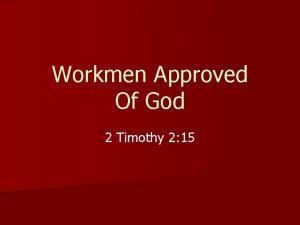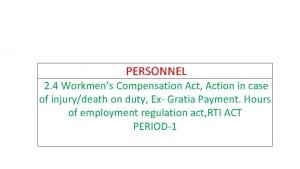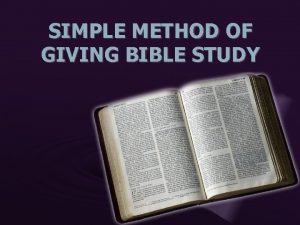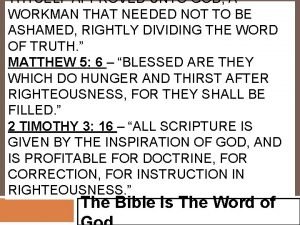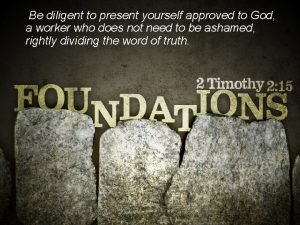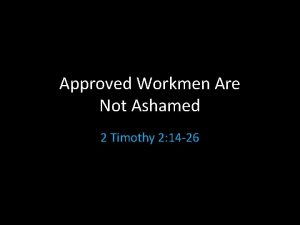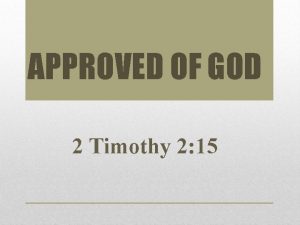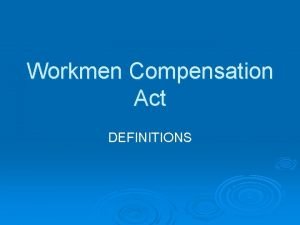Workmen Approved Of God 2 Timothy 2 15


![“Be diligent” defines spoudazō as “to make haste, hence to give diligence” [4704]. n “Be diligent” defines spoudazō as “to make haste, hence to give diligence” [4704]. n](https://slidetodoc.com/presentation_image/820ea65294ec5c523d2015c4af37f380/image-3.jpg)

![“To present yourself approved to God” defines dokimos as “tested, approved” [1384]. n BDAG “To present yourself approved to God” defines dokimos as “tested, approved” [1384]. n BDAG](https://slidetodoc.com/presentation_image/820ea65294ec5c523d2015c4af37f380/image-5.jpg)






![“Accurately handling the word of truth” Thomas defines orthotomeō as from orthos [straight, upright] “Accurately handling the word of truth” Thomas defines orthotomeō as from orthos [straight, upright]](https://slidetodoc.com/presentation_image/820ea65294ec5c523d2015c4af37f380/image-12.jpg)


- Slides: 14

Workmen Approved Of God 2 Timothy 2: 15

2 Timothy 2: 15 n Study to shew thyself approved unto God, a workman that needeth not to be ashamed, rightly dividing the word of truth (KJV). n Be diligent to present yourself approved to God as a workman who does not need to be ashamed, accurately handling the word of truth. (NASB 95)
![Be diligent defines spoudazō as to make haste hence to give diligence 4704 n “Be diligent” defines spoudazō as “to make haste, hence to give diligence” [4704]. n](https://slidetodoc.com/presentation_image/820ea65294ec5c523d2015c4af37f380/image-3.jpg)
“Be diligent” defines spoudazō as “to make haste, hence to give diligence” [4704]. n BDAG say it means “(1) to proceed quickly, hurry, hasten; (2) to speed up a process, expedite; (3) to be especially conscientious in discharging an obligation, be zealous/eager, take pains, make every effort, be conscientious. ” n Thomas

“Be diligent” n Serving Christ demands our utmost. For faith to triumph, it must be accompanied by strenuous exertion and sustained effort. n Many are lazy and lethargic, sluggish and slothful (Proverbs 18: 9; 24: 30 -34; 26: 1316). n Let us, therefore, be diligent in the Master’s service (Hebrews 4: 11; 6: 11 -12; 2 Peter 3: 14).
![To present yourself approved to God defines dokimos as tested approved 1384 n BDAG “To present yourself approved to God” defines dokimos as “tested, approved” [1384]. n BDAG](https://slidetodoc.com/presentation_image/820ea65294ec5c523d2015c4af37f380/image-5.jpg)
“To present yourself approved to God” defines dokimos as “tested, approved” [1384]. n BDAG say it pertains “(1) to being genuine on the basis of testing, approved (by test), tried and true, genuine; (2) to being considered worthy of high regard, respected, esteemed; (3) to being valuable, precious. ” n Thomas

“To present yourself approved to God” n Men often have the wrong value system, comparing themselves by themselves (Luke 16: 14 -15), commending themselves accordingly (Luke 18: 9 -14). n However, we will be judged, not by subjective human standards (2 Corinthians 10: 12), but by a perfect divine standard (Psalm 19: 7 -9; James 1: 22 -25).

“To present yourself approved to God” n One day we will stand before God in judgment (2 Corinthians 5: 9 -11; Revelation 20: 11 -15). n Therefore, we should be more concerned with divine rather than human approval (Galatians 1: 10; 1 Thessalonians 2: 3 -4).

“As a workman who does not need to be ashamed” n Thomas defines ergatēs as “a workman” [2040]. n BDAG say it refers to “(1) one who is engaged in work, worker, laborer; (a) of persons engaged in physical labor; (b) in transferred sense, of apostles and teachers; (2) one who effects something through work, a doer. ”

“As a workman who does not need to be ashamed” n There is a great need in the church for laborers, but few accept the responsibility of service (Matthew 9: 35 -38). n Those who are unproductive will be cast out as “wicked and slothful servants” (Matthew 25: 26 -30). n Like Epaphroditus (Philippians 2: 25 -30), let us diligently apply ourselves in serving God (1 Corinthians 15: 58).

“As a workman who does not need to be ashamed” defines anepaischuntos as “not to be put to shame” [422]. n BDAG say it pertains “to having no need to be ashamed…” n Thomas

“As a workman who does not need to be ashamed” n We cannot hide the quality of our service from God. He knows if we are lazy and inactive, infatuated with the world, troublemakers in the church, etc. n Will we be put to shame when God tries us? (Romans 2: 5 -11; Galatians 6: 7 -9). The faithful Christian can face the judgment with confidence (1 John 2: 28 -29; 4: 17 -18).
![Accurately handling the word of truth Thomas defines orthotomeō as from orthos straight upright “Accurately handling the word of truth” Thomas defines orthotomeō as from orthos [straight, upright]](https://slidetodoc.com/presentation_image/820ea65294ec5c523d2015c4af37f380/image-12.jpg)
“Accurately handling the word of truth” Thomas defines orthotomeō as from orthos [straight, upright] and temnō [to cut], meaning “to cut straight” [3718]. n BDAG say it is “found elsewhere independently of the NT only Proverbs 3: 6; 11: 5, where it … plainly means ‘cut a path in a straight direction’ or ‘cut a road across country (that is forested or otherwise difficult to pass through) in a straight direction’, so that the traveler may go directly to his destination. ” n

“Accurately handling the word of truth” By handling it carefully, interpreting and applying it properly, we cut a straight path through the Word of God. n Man must not add to or subtract from God’s Word (Deuteronomy 4: 1 -2; Proverbs 30: 5 -6; Revelation 22: 18 -19), nor turn aside to the right hand or the left (Deuteronomy 5: 32 -33; Joshua 1: 7 -8; 23: 6 -8). n Recognizing the difference between things that are divinely bound and loosed, (Matthew 16: 1719; 18: 18), let us learn not to go beyond the things that are written (1 Corinthians 4: 6). n

“Accurately handling the word of truth” There is great value in correctly understanding the Truth (Proverbs 3: 13 -18). n The faithful disciple does not change, or distort God’s word. He does not twist it, misapply it, take it out of context, or use it with wrong motive (2 Peter 3: 14 -18). n He prayerfully interprets Scripture in light of Scripture, carefully and correctly applying it to his daily life (1 Timothy 4: 11 -16). n
 Approved workmen are not ashamed
Approved workmen are not ashamed 2 timothy 2 15
2 timothy 2 15 Schedule 4 of workmen compensation act
Schedule 4 of workmen compensation act Study to show thyself approved unto god
Study to show thyself approved unto god A workman approved by god
A workman approved by god Be diligent to present yourself approved to god
Be diligent to present yourself approved to god Wic approved bread
Wic approved bread Opal approved ivms
Opal approved ivms Arizona wic food list
Arizona wic food list Autism authorization ctc
Autism authorization ctc Ncdsmo approved products list
Ncdsmo approved products list Distribution statement f
Distribution statement f Kirk lodge approved premises
Kirk lodge approved premises Wic formula georgia
Wic formula georgia Vdot approved products list
Vdot approved products list

